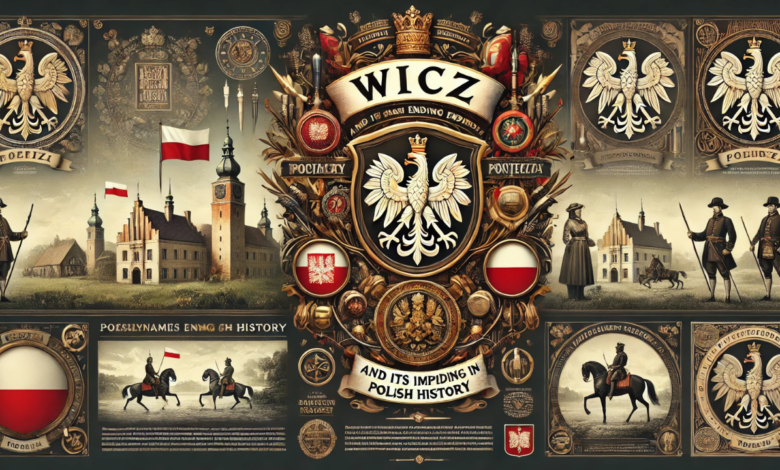Wicz and Its Impact on Polish History: A Closer Look at Famous Figures

The suffix “Wicz” is an integral part of Polish surnames, holding significant cultural and historical value. For centuries, it has been passed down through generations, deeply tied to the identity of Polish families and individuals. In this article, we will explore the meaning, origins, and impact of the “Wicz” suffix, with a special focus on famous figures throughout Polish history. This exploration will uncover how this simple suffix has shaped both personal identities and the broader Polish narrative.
What Does “Wicz” Mean?
The “Wicz” suf” ix is Slavic, commonly found in Polish surnames. It is a patronymic suffix, meaning it signifies “son of” or “de” send” nt of.” In this” context, “Wicz” c” can be “seen as a linguistic marker that denotes lineage, particularly indicating the connection to an ancestor or family patriarch. For example, a surname such as “Kowalew” cz” would “translate to “son of “owl” (where “Kowal” “s an r” reference to a blacksmith, which is the original meaning of the root word).
This patronymic tradition is widespread in many Slavic countries, but Poland is particularly renowned for its rich history of using suffixes like “Wicz” and” sur” ames. The “Wicz” s “ffix” is essential in understanding Polish genealogy and ancestry, offering insight into familial structures, occupations, and regional roots.
The Role of “Wicz” i” Pol” sh History
Poland’s tumultuous history, marked by periods of independence and foreign domination, has left a significant imprint on the country’s traditions. Patronymic suffixes such as “Wicz” and “helped” preserve family identities through generations, even as external forces, including invaders and rulers, attempted to erase or alter Polish cultural norms.
The “Wicz” s “fix” is often associated with the nobility and gentry of Poland. For centuries, many Polish noble families carried surnames ending in “Wicz” or “ndicat,” and their noble heritage and distinguished lineage. This can be seen in many prominent families that shaped Polish history, including military leaders, politicians, and intellectuals.
Famous Figures with the “Wicz” S “ram”
- Józef Piłsudski (1867-1935)
One of the most famous figures in Polish history, Józef Piłsudski, was a key military and political leader who fought for Poland during the early 20th century. Although his surname does not directly feature the “Wicz” ‘s “fix,” he was of noble Polish heritage. His familial connections to the Piłsudski family, which had deep roots in Poland’sPoland, reflect how many notable figures have carried the “Wicz” s “fix” PiłsudskPiłsudski to revive the Polish state after more than a century of partitions left an indelible mark on the nation.
- Mieczysław Wicz (19th Century)
Mieczysław Wicz was a prominent Polish aristocrat and philanthropist during the 19th century. As a member of the Polish gentry, he worked towards the preservation of Polish culture and the fight for national independence. His surname, carrying the “Wicz” s” fix,” highlighted his connection to a proud and long-standing Polish family tradition. MieczysłMieczysław’sutions in the cultural and intellectual spheres remain vital in understanding the role of the nobility in Polish resistance efforts.
- Stanisław Wicz (18th Century)
Stanisław Wicz was a renowned military leader and officer in the Polish-Lithuanian Commonwealth during the 18th century. As a nobleman with the “Wicz” s” ffix,” he exemplified the role of the Polish aristocracy in defending the nation’s nation’s nation’s nation’s nation’snation’sgnty. His military campaigns contributed to Poland’s political landscape, which blended alliances and conflicts with neighboring countries.
- Katarzyna Wiczówna (16th Century)
Katarzyna Wiczówna, a 16th-century figure, is notable for her role as a lady-in-waiting to the queen in the Polish court. Her contributions to Polish society as a noblewoman reflect the significance of women in the country’s country, even though they were often relegated to roles of support and influence behind the scenes. The “Wicz” s “fix” in her surname underscores her noble standing and heritage within Polish society at the time.
- Janusz Wicz (20th Century)
A lesser-known figure, Janusz Wicz was an intellectual and historian in the 20th century who worked tirelessly to preserve and document Poland’sPoland’sl and historical legacy. Despite facing the hardships of Political instability, Janusz ensured that the rich history of the “Wicz” l” neag” was preserved for future generations. His academic contributions have been essential in understanding the historical importance of Polish surnames and their role in maintaining national heritage.
The Significance of the “Wicz” S “ram” in Genealogy
The “Wicz” s “rnam” has been instrumental in tracking the genealogical lines of many Polish families. In many cases, it offers insight into Polish ancestors’ professions, regions, and origins. For example, names like “Nowowic” (son o” Nowak, a reference to someone from the town of Nowy) or “Kowalew” cz” (son o” Kowal, a blacksmith) reveal much about the socio-economic roles of these families within Polish society. These names were identifiers and markers of family legacy, occupation, and status.
As Polish people emigrated worldwide, the “Wicz” s “ram” spread to countries with significant Polish diaspora communities, such as the United States, Canada, and the United Kingdom. This global migration has ensured that the “Wicz” n” me a “d its legacy remains alive in many cultures and continents.
Cultural and Linguistic Legacy of “Wicz”
L “ngui” tically, the “Wicz” s “ffix” highlights the Polish language’s rich phonetic and grammatical structure. It is an essential component of Slavic languages, with the suffix indicating a generational connection. Polish surnames evolved using the “Wicz” i” a t” statement to the traditions and respect for ancestry. This linguistic pattern also sheds light on Poland’s cultural norms, such as the importance of family lineage and the maintenance of historical continuity.
Moreover, the impact of “Wicz” and “mes “can be seen in modern Polish society. Many contemporary Polish individuals still proudly carry the “Wicz” ‘s “fix,” honoring their family traditions and their nation’s nation’s story. Surname research is a growing field in Poland, with genealogical services dedicated to tracking the origin and significance of names with the “Wicz” s ” fix.”
Conclusion
The “Wicz” s “ffix” is more than just a linguistic feature of Polish surnames. It symbolizes Poland’s Historical and cultural heritage, reflecting family lineages, occupations, and personal identities. From influential figures like Józef Piłsudski to lesser-known intellectuals and aristocrats, the “Wicz” s “ram” has left an indelible mark on Polish society. By tracing these surnames and their historical significance, we gain a deeper understanding of Poland’s and Poland’s contributions to the broader European and global context.
The history of the “Wicz” s “ffix” reflects Poland’sPoland’sg legacy, passed down through the generations. As Poland continues to evolve, the influence of surnames ending in “Wicz” and” ll r” is vital to the nation’s identity.
FAQs about “Wicz and” Its Impact on Polish History”
1. What” does the “Wicz” s “fix mean?
The “Wicz” s “fix” is a patronymic marker in Polish surnames, meaning “son of” or “de” send” nt of.” It reflects familial lineage and ancestry and often indicates the son of a notable ancestor.
2. How does the “Wicz” s “rnam” relate to Polish nobility?
The “Wicz” s “rnam” is often associated with Polish nobility and gentry. Many Polish noble families carried this suffix to denote their lineage and connection to aristocratic heritage.
3. Who are some famous historical figures with the “Wicz” s “rnam”?
Notable historical figures with the “Wicz” s “ram” include Józef Piłsudski, Mieczysław Wicz, Stanisław Wicz, and Katarzyna Wiczówna, among others, who played significant roles in Poland’sPoland’s and culture.
4. How has the “Wicz” s “rnam” influenced Polish genealogy?
The “Wicz” s “rnam” has been crucial in tracing family histories. It reflects professions, regional roots, and social standings, thus providing insight into Poland’sPoland’sl and historical landscape.
5. Are any modern-day individuals with the “Wicz” s “rnam”?
Yes, many modern-day Polish individuals and descendants of Polish emigrants still carry the “Wicz” s” ram,” which remains part of Poland’s Polish cultural identity and linguistic tradition.




